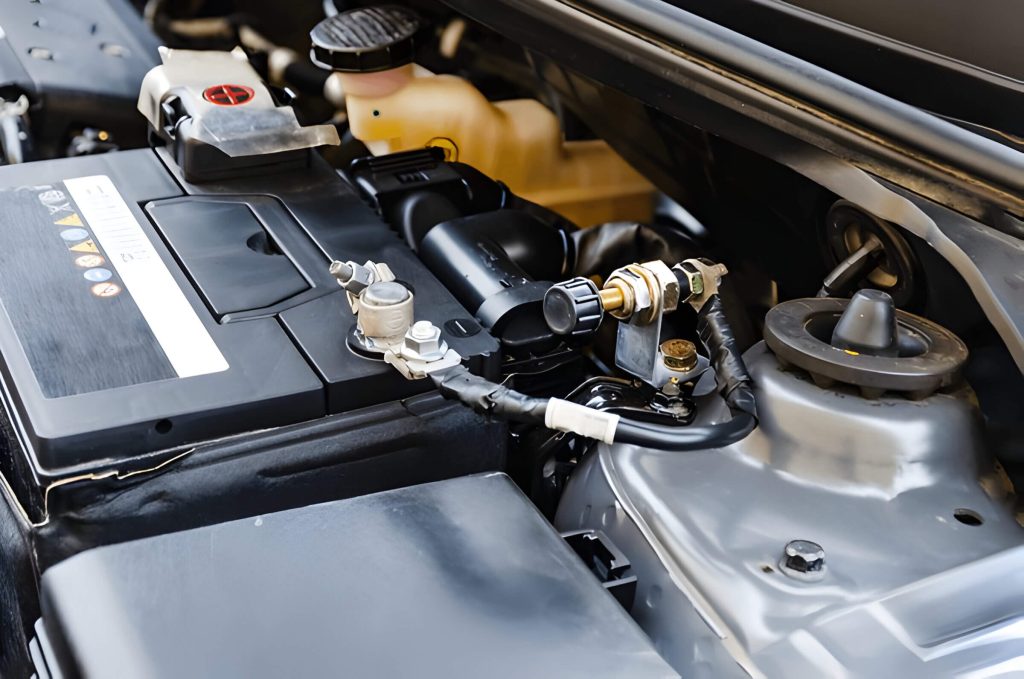
A car battery powers your vehicle’s electrical systems and typically lasts three to five years. Its lifespan depends on driving habits, climate, and maintenance. This text explores factors affecting battery life and offers tips for extending it through regular maintenance and inspection. Understanding these aspects and recognizing replacement indicators ensures reliable year-round performance.
Understanding the Lifespan of a Car Battery
The lifespan of a car battery is a crucial aspect to consider for any vehicle owner. On average, car batteries last between three to five years, though this can vary based on several factors. The typical car battery life expectancy depends on the type of battery, driving habits, and environmental conditions.
One common question is: how many years does a car battery last? While three to five years is the standard range, extreme temperatures 9both hot and cold0 can significantly shorten this period. Regular short trips can also prevent the battery from fully charging, leading to an earlier replacement.
It’s essential to recognize signs of a failing car battery to avoid unexpected breakdowns. Indicators include slow engine crank, dim headlights, and electrical issues within your vehicle. If you notice these symptoms or if your battery is nearing the end of its average lifespan, it’s wise to have it tested by a professional.
Regular maintenance and being aware of your car’s specific needs can help extend your car battery’s life expectancy. Keeping an eye out for warning signs will ensure you’re not caught off guard by a dead battery when you least expect it.
Factors That Affect Car Battery Longevity

Understanding the factors affecting car battery life is crucial for ensuring your vehicle remains reliable. Several key elements contribute to the lifespan of a car battery, and being aware of them can help you take proactive steps to extend its longevity.
Weather Impact on Car Batteries: Extreme temperatures, both hot and cold, can significantly affect car batteries. In hot weather, the heat can cause the battery fluid to evaporate, leading to internal damage and reduced capacity. Conversely, cold weather can slow down chemical reactions within the battery, making it harder for the engine to start.
Driving Habits and Battery Health: How you drive your car also plays a critical role in battery health. Short trips that don’t allow the battery to fully recharge can lead to a gradual loss of power over time. Additionally, frequent use of electronic accessories like GPS systems or charging ports without sufficient driving time can drain the battery faster.
Maintenance Tips for Longer Battery Life: Regular maintenance is essential for prolonging your car’s battery life. Ensure that your battery terminals are clean and free from corrosion. Check fluid levels if applicable and keep an eye on overall condition through periodic inspections by a professional mechanic. Investing in a quality charger or maintainer can also help keep your battery charged during periods of inactivity.
By understanding these factors and implementing proper maintenance practices, you can maximize the lifespan of your car’s battery and ensure dependable performance throughout its life cycle.
Essential Tips to Extend Your Car Battery Life
Extending your car battery life is crucial for ensuring that your vehicle remains reliable and efficient. Here are some essential tips to help you achieve this:
1. Regular Maintenance Tips for Batteries: Conduct regular inspections of your car battery. Check for any signs of corrosion, wear, or damage. Regular maintenance can help detect potential issues early before they become serious problems.
2. Avoid Short Trips: Frequent short trips can prevent your car battery from fully charging, leading to a shorter lifespan. Try to combine errands into one longer trip whenever possible, allowing the battery sufficient time to recharge.
3. Keep Terminals Clean: Corrosion on the battery terminals can impede the flow of electricity and reduce the efficiency of your battery. Regularly clean the terminals with a mixture of baking soda and water using a wire brush to ensure good connectivity.
4. Proper Charging Practices: Ensure that you follow proper charging practices if you use an external charger or maintain a vehicle that is not driven regularly. Overcharging or undercharging can significantly impact the longevity of your car battery.
By following these tips, you can effectively extend the life of your car battery, ensuring that it performs optimally and reliably for years to come.
The Importance of Regular Maintenance and Inspection
Regular maintenance and inspection of your car battery are crucial for ensuring the longevity and reliability of your vehicle. Establishing a consistent battery maintenance routine can help you avoid unexpected breakdowns and extend the life of your battery. One key aspect of this routine is inspecting car batteries regularly to check for any signs of wear or damage.
Professional check-ups for batteries are highly recommended, as trained technicians can identify potential issues that may not be immediately visible to the untrained eye. They can test the battery’s charge, clean any corrosion from terminals, and ensure that all connections are secure.
There are several signs you need to replace your battery soon, including slow engine cranking, dim headlights, and an illuminated check engine light. If you notice these symptoms, it’s essential to address them promptly to prevent being stranded with a dead battery.
By adhering to a regular maintenance schedule and seeking professional inspections when necessary, you can keep your car running smoothly and avoid the inconvenience of sudden battery failure.
When to Replace Your Car Battery
Knowing when to change your car battery is crucial for maintaining vehicle reliability and preventing inconvenient breakdowns. Here are some key indicators that suggest it might be time to replace your car battery:
1. Slow Engine Crank: One of the most common symptoms of dying car batteries is a slow engine crank. If you notice that your engine takes longer than usual to start, this could be a sign that your battery is losing its charge.
2. Dashboard Warning Light: Most modern cars come equipped with dashboard warning lights specifically designed to alert you about battery issues. If the battery light on your dashboard illuminates, it’s time to check the health of your battery.
3. Electrical Issues: Dimming headlights, malfunctioning power windows, and problems with other electrical components can indicate a failing battery. These systems rely heavily on the car’s electrical power supply, which can falter as the battery weakens.
4. Old Age: Car batteries typically last between 3-5 years. If your battery falls within this age range or older, it’s wise to consider replacing it preemptively before any major issues arise.
When it comes time for replacing old batteries safely, follow these steps:
1. Turn Off Your Vehicle: Ensure that your vehicle is turned off before beginning any work on the battery.
2. Wear Safety Gear: Use gloves and safety glasses to protect yourself from potential acid spills or sparks.
2. Disconnect Negative Terminal First: Always disconnect the negative terminal first (marked with a “-”) followed by the positive terminal (marked with a “+”).
3. Remove Old Battery Carefully: Lift out the old battery carefully and place it in a safe location away from children and pets.
4. Clean Battery Tray and Terminals: Before installing a new one, clean any corrosion from the tray and terminals using baking soda mixed with water.
5. Install New Battery Properly: Place the new battery into position and reconnect terminals in reverse order(positive first then negative).
Choosing the right replacement battery involves considering factors such as size, capacity (measured in cold cranking amps), brand reputation, and warranty options available in order to ensure optimal performance for years ahead.
By recognizing these symptoms of dying car batteries early on and following proper replacement procedures diligently while selecting an appropriate model suited specifically for one’s vehicle needs ensures uninterrupted driving experiences without unforeseen disruptions along road journeys ahead!


